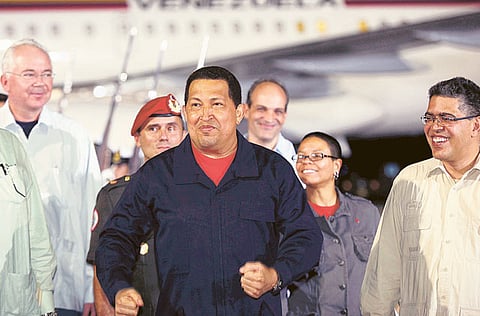Secrecy surrounds Chavez
His exhortations urging unity, suggest that the Venezuelan president is worried that any relaxation of his grip risks unleashing a struggle for power

The Venezuelan constitution guarantees citizens the right to "timely, accurate and impartial information". But as Hugo Chavez, the man who inspired the document, departed on July 16 to resume his cancer treatment in Cuba, friends and foes alike were once again left with no answer to the question of the moment: just how ill is the president, and what is the prognosis? (Chavez returned to Venezuela from Cuba on July 23).
According to the official version, Chavez underwent emergency surgery for a "pelvic abscess" in early June, after symptoms emerged when he happened to be in Cuba. It was not until June 30 that he admitted, in a recorded video, what some independent journalists had been claiming for some time: that a second operation had removed a cancerous tumour. He returned, unannounced, to Caracas on July 4 in time to watch (on television) the celebrations of the bicentenary of Venezuela's independence.
In brief (by his standards) media appearances, he let slip a few more details of his condition. But there has not been a single medical bulletin, and even the precise location of the ‘baseball-sized' tumour has still not been revealed.
His choice of Cuba for further treatment suggests that the secrecy will continue.
Venezuela's medical association is offended because Chavez has sought care outside the country. Some opponents have pointed out that when Cuba's veteran leader, Fidel Castro, underwent abdominal surgery in 2006, Cuban doctors were reported to have botched the initial operation. But in communist Cuba, the information blackout about Chavez's treatment can be kept up. He insists that "not a single malignant cell" has been found anywhere else in his body. But he admits that he will require chemotherapy, contradicting earlier statements by aides.
When he requested permission from the National Assembly to leave the country, Chavez, a former army officer, gave no date of return. For the first time, he has delegated some of his administrative and budgetary powers, to the vice-president, Elias Jaua, and to the finance and planning minister, Jorge Giordani.
Pro-government legislators argue that the opposition is seeking to ease Chavez out of office. But his many exhortations in recent weeks urging unity, both in the ruling party and in the army, suggest that the president is worried that any relaxation of his grip risks unleashing a struggle for power.
That is because Chavez has created a personalised regime of government-by-live-television in which senior officials must interpret his every whim on pain of dismissal.
To endeavour to show that he remains in charge, before his departure he created, on camera, an electronic signature for use while he is away. But it will take more than such theatrics to dispel the doubts over his ability to micromanage affairs of state from a Cuban hospital. The governance of Venezuela is now bound up with the president's illness. Treating this as a state secret may only increase the tension back home.


